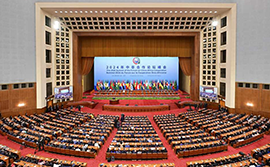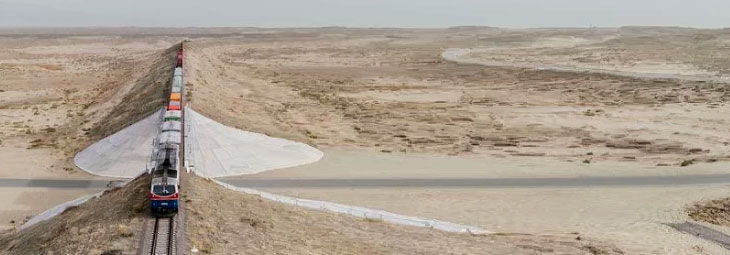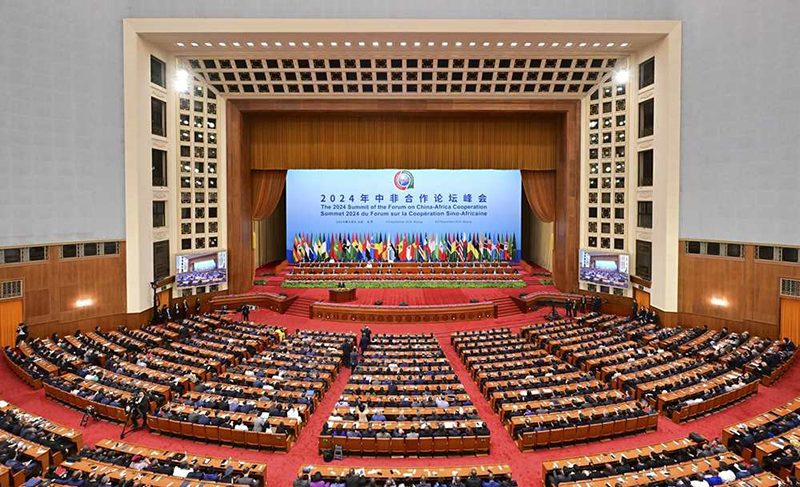


1. Preamble
From September 4 to 6, 2024, the Forum on China-Africa Cooperation (FOCAC) Beijing Summit and the 9th Ministerial Conference were held in Beijing. Heads of state, government leaders, heads of delegations from 53 African countries, the Chairperson of the African Union Commission (hereinafter referred to as "both sides"), as well as foreign ministers and ministers responsible for economic cooperation, attended the summit and the ministerial conference.

On the morning of September 5th, 2024, the Forum on China-Africa Cooperation (FOCAC) Beijing Summit opened at the Great Hall of the People in Beijing[Photo/Xinhua]
Both sides praised the FOCAC for promoting comprehensive and deep development of China-Africa friendly cooperation over the past 24 years, in line with the historical trends of peace, development, cooperation, and win-win outcomes. Despite challenges such as global instability, sluggish economic recovery, and the COVID-19 pandemic, the forum has become an efficient platform for South-South cooperation and a "golden brand" for international cooperation with Africa.
Both sides expressed satisfaction with the comprehensive and effective implementation of the follow-up actions of the "Nine Projects" proposed at the 8th Ministerial Conference in 2021, the Dakar Action Plan (2022-2024), the China-Africa Cooperation Vision 2035, and the China-Africa Declaration on Climate Change Cooperation. They commended the successful China-Africa Leaders' Dialogue in South Africa, where the "Support for Africa’s Industrialization Initiative," "China’s Plan to Aid Africa’s Agricultural Modernization," and the "China-Africa Talent Development Cooperation Plan" were launched. Both sides pledged to implement these initiatives and plans to achieve shared prosperity.
Both sides highly praised the mutual support during the COVID-19 pandemic, successfully hosting the China-Africa Solidarity Against COVID-19 Extraordinary Summit, which set an example of global cooperation in fighting the pandemic and opened a new chapter in the China-Africa community with a shared future. China appreciated Africa's support for its decisive anti-pandemic measures, and Africa commended China's significant assistance and support.
Both sides emphasized that China-Africa relations, guided by the principles of sincerity, real results, affinity, and good faith, and based on openness and inclusiveness, have entered a new era of building a high-level China-Africa community with a shared future. China reaffirmed its commitment to non-interference in Africa’s pursuit of development paths suited to their national conditions, non-intervention in internal affairs, non-imposition of political conditions in aid, and non-pursuit of unilateral political interests in investment and financing. Both sides will uphold the "spirit of China-Africa friendship and cooperation" and jointly build a new era of an all-weather China-Africa community with a shared future.
Both sides fully endorsed the leadership of China and Africa in advocating the construction of a community with a shared future for mankind, promoting high-quality Belt and Road cooperation, the Global Development Initiative, Global Security Initiative, Global Civilization Initiative, the African Union’s Agenda 2063's second ten-year implementation plan, and the UN 2030 Agenda for Sustainable Development. Together, they aim to advance global governance through consultation, contribution, and shared benefits, establish a new type of international relations, practice the common values of humanity, and build a world of lasting peace, universal security, common prosperity, openness, inclusivity, and environmental sustainability.
Both sides affirmed that Africa is an important partner in the Belt and Road Initiative (BRI). They will adhere to the principles of consultation, joint contribution, and shared benefits, advancing BRI cooperation in line with the "Silk Road spirit" of peace, cooperation, openness, inclusivity, mutual learning, and win-win outcomes, as well as Agenda 2063, particularly the Programme for Infrastructure Development in Africa (PIDA), the UN 2030 Agenda for Sustainable Development, and African national development strategies. Both sides aim to strengthen security measures for BRI projects and personnel, contributing to international cooperation, global economic growth, and accelerating the implementation of the UN 2030 Agenda for Sustainable Development.
China appreciated Africa’s efforts to strengthen unity and self-reliance, accelerate integration, and respond collectively to various risks and challenges. China also commended African countries like Egypt for successfully hosting the UN Climate Change Conference (COP). Both sides believed that China and Africa's development would create more opportunities for human progress, collective security, and mutual respect for each other’s civilizations. They committed to strengthening cooperation on the above initiatives and jointly voicing the concerns of developing countries on shared issues, advocating for a more equitable, orderly, and inclusive multipolar world and economic globalization.
Both sides acknowledged that the world is undergoing unprecedented changes. The Global South, represented by China and Africa, is growing rapidly and influencing the course of world history. Both sides remain committed to South-South cooperation, opposing ideological divisions and bloc confrontations, and defending the common interests of Global South countries in the ongoing reforms of the global governance system. Both sides support each other's efforts to safeguard sovereignty, security, and development interests. Africa reaffirmed its commitment to the One China policy and pledged continued support on issues related to China's core interests and major concerns.
Both sides acknowledged that China is the world’s largest developing country, committed to promoting high-quality development through high-level opening up and advancing national rejuvenation through Chinese-style modernization. Africa highly appreciated the Chinese Communist Party's 20th Central Committee's third plenary session held in July, which set out comprehensive plans for further reform and modernization in China, bringing more opportunities and hope to the world, including African countries. Africa, as the continent with the most developing countries, has initiated the second ten-year implementation plan of Agenda 2063, accelerating the construction of the African Continental Free Trade Area (AfCFTA) and striving for an integrated, prosperous, and peaceful Africa. On this basis, both sides will explore paths to peaceful development, mutual cooperation, and common prosperity, building a partnership of trust, mutual benefit, support, and learning that better benefits the people of China and Africa.
Both sides commended the four high-level conferences held during the summit: "Strengthening Exchanges on Governance Experience, Exploring Modernization Pathways," "Industrialization, Agricultural Modernization, and Green Development: The Path to Modernization," "Working Together for Lasting Peace, Universal Security, and a Shared Future for Modernization," and "High-Quality Belt and Road Cooperation: Building a Modernization Platform for Joint Contribution and Shared Benefits." Both sides will deepen cooperation in these areas based on the consensus reached by China-Africa leaders.
To implement the outcomes of the summit, both sides jointly formulated and adopted this action plan, aiming to promote mutually beneficial cooperation across various fields under the theme of "Advancing Modernization Together and Building a High-Level China-Africa Community with a Shared Future" for the next three years or beyond.
2. China's Key Unilateral Initiatives to Support Africa in the Next Three Years
The African side highly appreciates the key initiatives for cooperation with Africa over the next three years announced by President Xi Jinping during the opening ceremony of the Forum on China-Africa Cooperation (FOCAC) Beijing Summit. They believe these initiatives are forward-looking and strategic, aligning with Africa's future development needs and injecting strong momentum into the leapfrog development of China-Africa cooperation. The African side is willing to work with China to strengthen the alignment of development strategies and jointly promote the implementation of relevant initiatives.
China is ready to work with Africa over the next three years to implement the "China-Africa Ten Partnership Actions for Advancing Modernization Together," covering ten areas: mutual learning of civilizations, trade prosperity, industrial chain cooperation, connectivity, development cooperation, health and wellness, agricultural and rural development, cultural and people-to-people exchanges, green development, and security.
Civilizational Mutual Learning Partnership Action: China is willing to work with Africa to build a partnership for dialogue under the Global Civilization Initiative and establish a platform for sharing governance experiences between China and Africa. China will support the establishment of a China-Africa Development Knowledge Network and 25 China-Africa research centers. Relying on the African Leadership Academy, China will cultivate governance talents and invite 1,000 African political party representatives to China for exchanges.
Trade Prosperity Partnership Action: China will grant zero-tariff treatment for 100% of products from the least developed countries that have established diplomatic relations with China. It will sign framework agreements for economic partnership with willing African countries, strengthen cooperation in inspection, quarantine, and standards, and expand market access for African agricultural products. China will deepen e-commerce cooperation with Africa, support African countries in setting up national pavilions in China's "Silk Road E-commerce" pilot zones, and hold "online masterclasses" to train African e-commerce talents. China will implement the "China-Africa Quality Enhancement Program," establish a China-Africa Standardization Cooperation and Research Center, and launch the China-Africa Trade Digital Trust Platform to enhance capacity-building for conformity assessment.
Industrial Chain Cooperation Partnership Action: China will support local value chain construction, manufacturing development, and deep processing of key minerals in Africa. Five China-Africa industrial cooperation growth zones will be built in African regions, and 10 industrial park infrastructure projects will be funded. China will host 100 training programs for industrialization talents and establish a China-Africa in-depth economic and trade cooperation fund to foster enterprise cooperation and park linkage development. China will also implement the "Africa SME Empowerment Program" to provide financing support and training for 1,000 business managers. A China-Africa Digital Technology Cooperation Center will be built, with 20 digital infrastructure and transformation pilot projects in Africa.
Connectivity Partnership Action: China will continue supporting Africa’s integration by backing 30 infrastructure connectivity projects and assisting with the African Union and African Continental Free Trade Area (AfCFTA) initiatives. China will promote transportation infrastructure and industrial park linkage development and build a multimodal transport system connecting China's central and western regions with Africa. China will enhance financial connectivity between the two sides, deepen cooperation in local currency settlement and financial technology, and welcome African nations to issue Panda bonds in China.
Development Cooperation Partnership Action: China will issue a joint statement with Africa on deepening cooperation under the Global Development Initiative and co-establish a Global Development Promotion Center Network. China will support 1,000 "small yet impactful" livelihood projects and assist in organizing the 2026 Youth Olympic Games and 2027 Africa Cup of Nations. China will contribute 50 million USD to extend the China-World Bank Partnership Facility, focusing on inclusive and sustainable development in Africa, and call on the international community to provide liquidity and financial support to Africa.
Health and Wellness Partnership Action: China will establish the China-Africa Hospital Alliance, build a batch of joint medical centers, and strengthen cooperation in traditional medicine and smart healthcare. The "Minimally Invasive Medicine Plan" will be implemented. China will deepen public health cooperation, train 100 professionals, and support the construction of Africa CDC headquarters and five sub-regional centers. China will dispatch 2,000 medical personnel and public health experts, conduct 10 medical infrastructure projects, and help African nations enhance local pharmaceutical production.
Agricultural and Rural Development Partnership Action: China will support Africa in achieving food security and sustainable agricultural development by building a China-Africa Agricultural Modernization Cooperation Network. Ten agricultural technology demonstration centers will be established or upgraded, and China will provide 1 billion Chinese Yuan in emergency food assistance. China will send 500 agricultural experts to Africa, train 1,000 agricultural leaders, and carry out the "100 Enterprises, 1,000 Villages" initiative with 500 public welfare projects in maternal and child health, education, rural development, and clean drinking water. Chinese enterprises in Africa will create no less than 1 million local jobs.
Cultural and People-to-People Exchange Partnership Action: The "Future Africa-China Vocational Education Cooperation Program" will be implemented, and China will build or upgrade 10 Luban Workshops and 20 schools. China will provide 60,000 training opportunities and focus on women's empowerment and youth development. The "Culture Silk Road" program will be promoted, inviting 1,000 African cultural and tourism professionals to China. China will also launch the "China-Africa Broadcast and Audiovisual Cooperation Innovation Program" and designate 2026 as the "Year of China-Africa Cultural Exchange."
Green Development Partnership Action: China will support Africa's efforts to enhance climate resilience, provide clean energy technologies, and carry out 30 clean energy projects. A China-Africa Green Industry Chain Fund will be established, and China will collaborate with Africa on disaster prevention, biodiversity protection, and desertification control. A China-Africa Satellite Remote Sensing Cooperation Center will be set up, and cooperation on marine spatial planning and space research will be promoted.
Security Partnership Action: China will support Africa in establishing a Global Security Initiative partnership and provide 1 billion Chinese Yuan in military aid to African countries. China will train 6,000 military personnel, host 500 young African officers in China, and carry out joint military exercises and patrols. China will implement the "African Demining Assistance Program" and enhance security cooperation under the Belt and Road Initiative.
To support these "Ten Partnership Actions," China will provide 360 billion Chinese Yuan in funding over the next three years, including 210 billion Chinese Yuan in credit and 80 billion Chinese Yuan in aid, with at least 70 billion Chinese Yuan invested by Chinese enterprises.
Additionally, China and Africa agree to strengthen cooperation in areas such as peace, governance, modernization, agriculture, industrialization, talent development, energy, trade, and sustainable development. The two sides have decided that the 10th FOCAC Ministerial Conference will be held in 2027 in the Republic of Congo, and the 18th and 19th Senior Officials Meetings will take place in 2026 and 2027, respectively. Starting in 2030, the term of the Forum's African co-chair will be shortened from six years to three years, with the Republic of Congo and Equatorial Guinea succeeding as co-chairs in 2024-2027 and 2027-2030, respectively.
Source:https://www.yidaiyilu.gov.cn/p/040LBU1L.html
Translated by Lu Yu fei